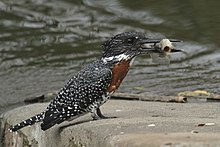Giant kingfisher
| Giant Kingfisher | |
|---|---|

| |
| Male at Abuko, The Gambia | |
| Scientific classification | |
| Kingdom: | |
| Phylum: | |
| Class: | |
| Order: | |
| Family: | |
| Genus: | |
| Species: | M. maxima
|
| Binomial name | |
| Megaceryle maxima (Pallas, 1769)
| |

| |
| The Distribution of the Giant Kingfisher | |
The Giant Kingfisher (Megaceryle maxima) is the largest kingfisher in Africa, where it is a resident breeding bird over most of the continent south of the Sahara Desert other than the arid southwest.

There are two subspecies, M. m. maxima, found in open country, and M. m. gigantea in the rainforest. The forest race is darker, less spotted above, and more barred below than maxima, but the two forms intergrade along the forest edge zone.
Breeding is from August to January, 3–5 eggs being laid in a riverbank tunnel.
Giant Kingfisher is 42–48 cm long, with a large crest and finely spotted white on black upperparts. The male has a chestnut breast band and otherwise white underparts with dark flank barring, and the female has a white-spotted black breast band and chestnut belly.
The call is a loud wak wak wak.
This large species feeds on crabs, fish, and frogs, caught in the typical kingfisher way by a dive from a perch.
References
- Template:IUCN2006 Database entry includes justification for why this species is of least concern.
- C H Fry & Kathie Fry (2000). Kingfishers, Bee-eaters and Rollers. Princeton University Press. ISBN 0691048797.
{{cite book}}: Unknown parameter|coauthors=ignored (|author=suggested) (help)

